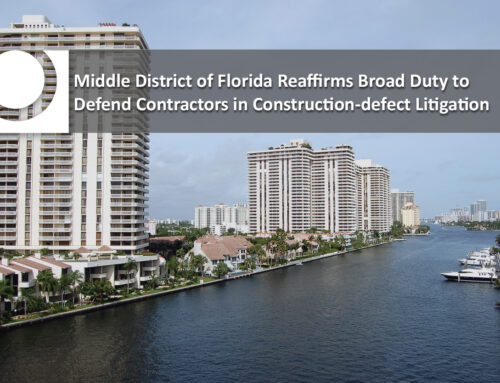Recently, the Illinois Court of Appeals emphasized the importance of careful pleading when it comes to triggering an insurer’s duty to defend. In West Bend Mut. Ins. Co. v. Pulte Home Corp. (May 15, 2015), the court upheld a trial court’s denial of West Bend Mutual Insurance Company’s (“West Bend”) motion for summary judgment, which argued that West Bend had no duty to defend a developer and siding subcontractor in a construction-defect lawsuit filed by a homeowner’s association for alleged property damage resulting from improper installation of siding (among other things).
On appeal, the court analyzed whether the allegations in the complaint contained any claims and/or damages which might have the potential for coverage under West Bend’s policy. After reviewing the key allegations, the court upheld the trial court’s decision that West Bend had a duty to defend the developer and siding subcontractor. This decision to uphold West Bend’s obligation to defend was made despite the fact that Illinois courts had previously ruled that property damage to a building caused by a contractor’s defective construction was not an accident and therefore does not constitute an “occurrence” under traditional commercial general liability coverage forms. According to the West Bend court, although the complaint alleges damages for the cost to repair the defective siding installed by the insured, it also alleges “other damages” which might be potentially covered under West Bend’s policy. “[D]amage to something other than the project itself does constitute an ‘occurrence’ under a CGL policy.” Because the complaint alleged unspecified other damages, the court held this was sufficient to trigger West Bend’s duty to defend under its policy.
Often, and especially in construction-defect cases, the contractor’s insurance is the only asset left from which a property owner may be able to recover. This is particularly true where the contractor is bankrupt or otherwise a defunct company. West Bend emphasizes the importance of claimants pleading their way into coverage, even if only to have the other side represented by counsel and a live body on the other side from which to negotiate. Furthermore, in most states, once the carrier has agreed to defend a contractor, albeit under a reservation of rights, that duty to defend also carries with it the duty on behalf of the contractor to negotiate a settlement in good faith. Thus, once again highlighting the importance of a claimant pleading into coverage.



